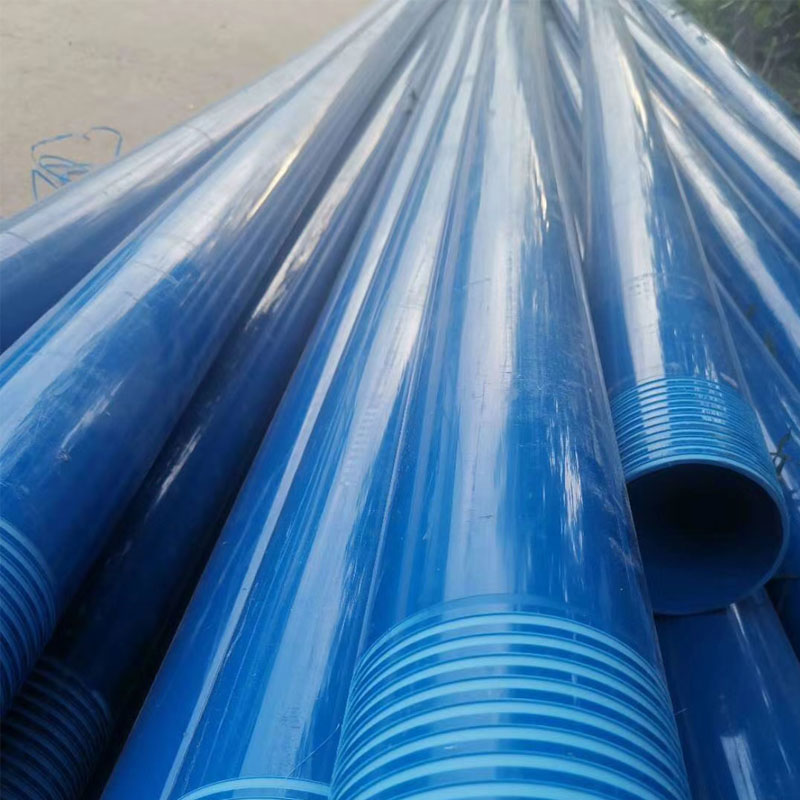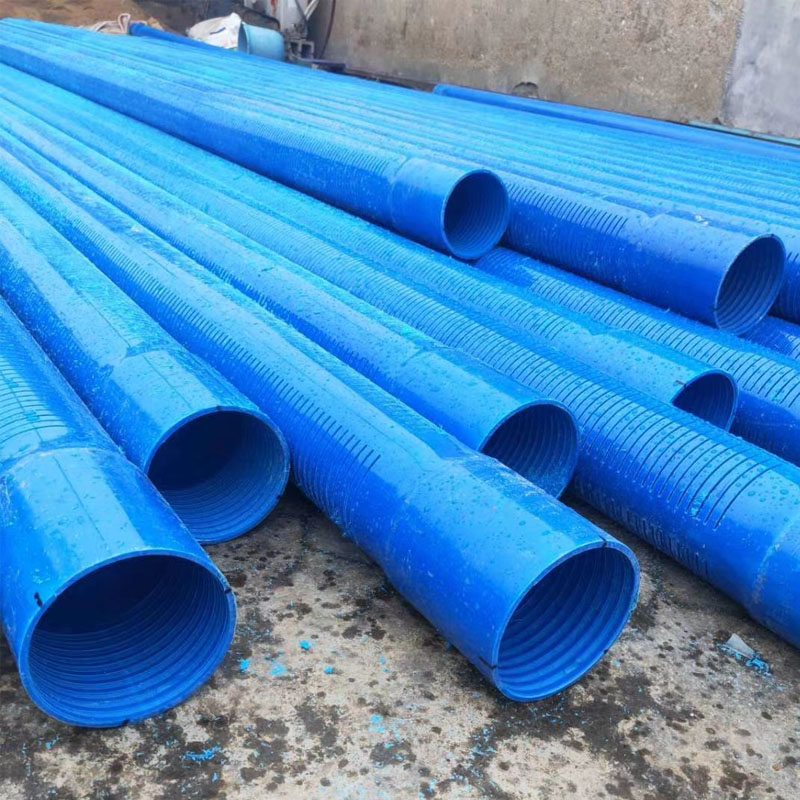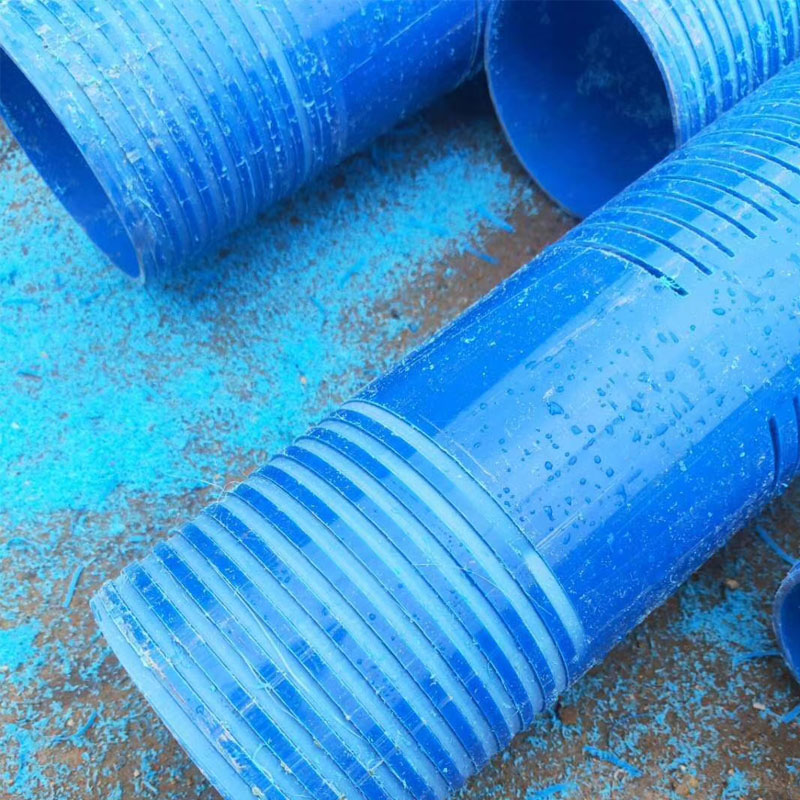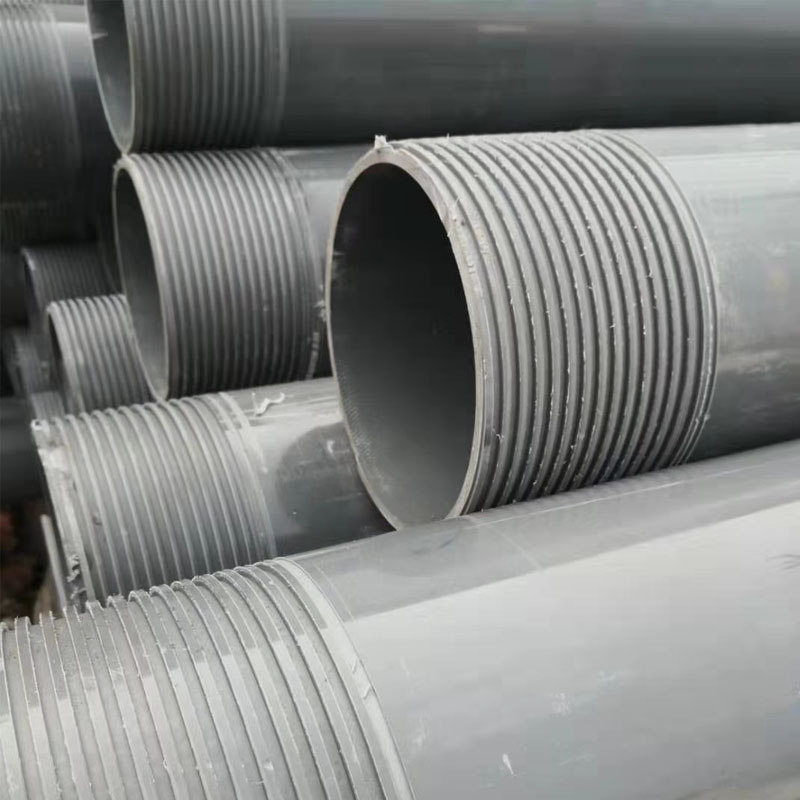Aug . 16, 2025 03:40 Back to list
Durable DN100 PVC Well Casing Pipes for Reliable Water Supply
Industry Trends and the Enduring Value of PVC in Well Casings
The global demand for reliable and sustainable water infrastructure continues to accelerate, driven by population growth, climate change, and the increasing need for efficient resource management. Within this dynamic landscape, the selection of appropriate materials for critical components like well casings is paramount. Historically, various materials have been employed, but modern industry trends increasingly favor advanced polymeric solutions due to their superior performance characteristics and cost-effectiveness. Specifically, DN100 PVC pipes for well casings have emerged as a cornerstone technology, offering unparalleled benefits in diverse applications ranging from agricultural irrigation to municipal water supply and environmental monitoring. The shift towards PVC is underpinned by its inherent resistance to corrosion, reduced installation complexity, and a significantly longer service life compared to traditional metallic alternatives. This material choice aligns perfectly with contemporary sustainable engineering practices, providing a durable, non-toxic, and energy-efficient solution for groundwater extraction and monitoring systems. The market is continuously evolving, with a growing emphasis on products that not only meet stringent performance requirements but also contribute to long-term operational savings and environmental stewardship.
As technological advancements continue to refine PVC manufacturing processes, the quality and reliability of PVC well casing pipes have reached new heights. Industry data indicates a steady increase in the adoption rate of PVC pipes for water well applications, a trend supported by their robust mechanical properties and chemical inertness. For instance, the global PVC pipe market size was valued at USD 60.1 billion in 2022 and is projected to reach USD 110.4 billion by 2030, demonstrating a compound annual growth rate (CAGR) of 7.9% from 2023 to 2030, with water and wastewater treatment remaining a dominant application segment. This growth trajectory underscores the material’s proven efficacy and the trust placed in it by engineers and contractors worldwide. The application of DN100 PVC pipes for well casings specifically addresses the critical need for a stable, uncontaminated conduit for groundwater, preventing ingress of undesirable substances and ensuring the integrity of the wellbore over decades. This commitment to quality and performance ensures that modern well construction is both efficient and environmentally responsible, setting new benchmarks for the industry in terms of both durability and economic viability.
Technical Specifications and Parameters for Optimal Performance
Understanding the precise technical specifications of DN100 PVC pipes for well casings is crucial for ensuring the integrity and longevity of any water well project. DN100, referring to "Diameter Nominal 100," indicates an approximate inner diameter of 100 millimeters, making it suitable for a wide range of groundwater extraction and monitoring applications. These pipes are typically manufactured from unplasticized polyvinyl chloride (uPVC), a robust thermoplastic material renowned for its exceptional chemical resistance, high strength-to-weight ratio, and non-toxic properties. Key performance indicators for these pipes include their pressure rating, which determines their suitability for various depths and pumping pressures, and their resistance to environmental factors such as UV radiation and soil aggressors. Compliance with international standards such as ISO 1452 (Plastics piping systems for water supply) and ANSI/AWWA C900 (Polyvinyl Chloride (PVC) Pressure Pipe) is a non-negotiable requirement, ensuring that the pipes meet rigorous quality and performance benchmarks. The inherent smoothness of the PVC internal surface minimizes friction losses, contributing to energy efficiency in pumping operations and preventing scale buildup over time, a common issue with metallic pipes.
A detailed examination of typical product specifications reveals the sophisticated engineering behind high-quality DN100 PVC pipes for well casings. These parameters are meticulously controlled during the manufacturing process to guarantee consistent performance across diverse geological conditions and operational demands. For instance, the wall thickness directly correlates with the pipe's pressure resistance and structural stability, ensuring it can withstand external soil loads and internal hydraulic pressures without deformation or failure. Similarly, the jointing mechanism, often bell-and-spigot with elastomeric seals or threaded connections, is critical for maintaining watertight integrity and simplifying installation. The expected service life of high-quality uPVC well casings can exceed 50 years under normal operating conditions, significantly outperforming many traditional materials. This extended lifespan translates into reduced maintenance costs and fewer interventions, providing substantial long-term economic benefits for well operators and municipalities.

Typical Specifications for DN100 PVC Well Casing Pipes
| Parameter | Value/Description | Standard/Note |
|---|---|---|
| Nominal Diameter (DN) | DN100 (approx. 110 mm OD) | ISO 4065 / EN ISO 11922 |
| Material | Unplasticized Polyvinyl Chloride (uPVC) | Food-grade, Non-toxic |
| Pressure Rating (PN) | PN6, PN8, PN10, PN12.5, PN16 (6-16 bar) | ISO 1452-2 |
| Length | Typically 3m or 6m (customizable) | |
| Jointing Method | Plain end, Socket end, Threaded (API standard options) | |
| Color | Blue, White, or Grey (depends on manufacturer) | |
| Ring Stiffness (SN) | SN4, SN8 (typical for well casings) | EN ISO 9969 |
| UV Resistance | Excellent with proper formulation | ASTM D2564 |
Manufacturing Process and Rigorous Quality Assurance
The production of high-quality DN100 PVC pipes for well casings involves a sophisticated extrusion process, which is critical to achieving the desired physical and mechanical properties. This process begins with the precise formulation of PVC resin compounds, incorporating stabilizers, lubricants, and pigments to enhance durability, UV resistance, and overall performance. Unlike metallic pipes that might undergo casting or forging, PVC pipes are typically extruded. The PVC compound is fed into a specialized extruder, where it is heated and melted, then forced through a die to form a continuous pipe. Downstream equipment cools, sizes, and cuts the pipe to specified lengths. This continuous manufacturing process ensures uniformity in wall thickness and diameter, which are paramount for pressure integrity and ease of installation in boreholes. State-of-the-art manufacturing facilities employ advanced automation and process control systems to maintain tight tolerances and minimize defects, ensuring each pipe meets the stringent requirements for well casing applications, where reliability is non-negotiable.
Quality assurance and control are integrated at every stage of the manufacturing workflow for DN100 PVC pipes for well casings. Raw material inspections verify the purity and consistency of PVC resin and additives. During extrusion, continuous monitoring of temperature, pressure, and line speed ensures optimal material fusion and dimensional accuracy. Post-extrusion, each pipe undergoes a series of rigorous tests to validate its structural integrity and performance characteristics. These tests typically include hydrostatic pressure testing to confirm burst strength, impact resistance tests to assess durability during handling and installation, and dimensional checks to ensure compliance with specified outer diameter, inner diameter, and wall thickness. Furthermore, chemical resistance tests may be conducted to simulate long-term exposure to various groundwater compositions. Compliance with international standards such as ISO 9001 for quality management systems and ISO 14001 for environmental management underscores a manufacturer's commitment to producing reliable and sustainable products. Some manufacturers may also adhere to specialized drilling industry standards like ASTM F480 for thermoplastic well casing pipe, providing an additional layer of assurance for critical applications. This multi-layered approach to quality control ensures that only the highest-grade pipes reach the market, providing peace of mind for engineers and well drillers.

Versatile Application Scenarios and Unmatched Technical Advantages
The versatility of DN100 PVC pipes for well casings extends across a broad spectrum of industries and application scenarios, making them an indispensable component in modern water management and resource extraction. In agricultural irrigation, these pipes provide a robust and cost-effective solution for boreholes that supply water to farms, ensuring consistent water availability for crops and livestock. In municipal water supply systems, they serve as reliable casings for deep wells that feed drinking water networks, where maintaining water purity and preventing contamination are paramount. Beyond water supply, PVC casings are widely used in environmental monitoring wells, enabling accurate sampling of groundwater for pollution assessment and remediation efforts without chemical interaction from the casing material itself. Their application also extends to geothermal drilling for ground-source heat pump systems, where their thermal stability and corrosion resistance are significant advantages. Industries like petrochemical and metallurgy, while not directly using these pipes for fluid transport, might utilize them for ancillary water supply or groundwater monitoring related to their operations, leveraging the benefits of non-corrosive infrastructure. The inherent adaptability and proven performance of DN100 PVC pipes make them the material of choice for engineers seeking long-term reliability and operational efficiency in demanding environments.
The technical advantages of employing DN100 PVC pipes for well casings are multifaceted and directly translate into significant operational and economic benefits. Chief among these is their exceptional resistance to corrosion and chemical degradation. Unlike steel casings that are susceptible to rust and electrolytic corrosion in aggressive soil or water conditions, PVC remains inert, ensuring the structural integrity of the wellbore and preventing the leaching of metallic ions into the groundwater. This non-reactive nature also means they are ideal for maintaining water purity, making them particularly suitable for potable water applications. Furthermore, PVC pipes are significantly lighter than their metallic counterparts, drastically simplifying transportation, handling, and installation processes. This weight advantage reduces the need for heavy machinery, lowers labor costs, and accelerates project timelines, contributing to overall energy savings in construction. The smooth interior surface of PVC pipes minimizes flow resistance, leading to reduced pumping costs and improved hydraulic efficiency over the lifespan of the well. Their superior durability and extended service life, often exceeding 50 years, ensure a lower total cost of ownership (TCO) compared to alternative materials that may require frequent maintenance or replacement. These combined benefits position PVC pipes as the optimal solution for sustainable and efficient well construction.
Choosing the Right Supplier: Manufacturer Comparison and Customization Solutions
Selecting the appropriate manufacturer for DN100 PVC pipes for well casings is a critical decision that impacts the long-term success and integrity of any well project. A reputable supplier should demonstrate not only adherence to international quality standards such as ISO 9001 and ISO 14001 but also possess a proven track record in the industry, evidenced by years of service and a robust portfolio of successful projects. Key factors to consider when evaluating manufacturers include their material sourcing policies, manufacturing process controls, and the extent of their product testing and certification. Beyond standard product offerings, a leading manufacturer will also provide extensive customization solutions to meet the unique demands of specific well drilling operations. This might include varying pipe lengths, specialized threading options (e.g., API standard threads for compatibility with drilling equipment), custom slotting or perforation patterns for screen sections, or unique pressure ratings to accommodate exceptional depths or geological conditions. The ability to offer tailored solutions ensures that clients receive precisely engineered products that integrate seamlessly into their project requirements, optimizing performance and installation efficiency.
Beyond product quality, a reliable supplier of DN100 PVC pipes for well casings should offer comprehensive technical support, from initial consultation and design assistance to post-sales service. Their expertise should extend to guiding clients through material selection, pressure rating calculations, and installation best practices. Furthermore, evaluating a manufacturer's capacity for timely delivery and their logistical capabilities is essential, especially for large-scale projects where delays can incur significant costs. Service level agreements (SLAs) and transparent delivery schedules are indicators of a professional and dependable partner. Companies with extensive experience and strong industry partnerships often provide better value through optimized production processes and economies of scale. Prioritizing manufacturers who offer clear warranty commitments and responsive customer support ensures long-term confidence in the product and the partnership, mitigating potential risks associated with critical infrastructure components.

Key Manufacturer Comparison Factors
| Factor | High-Quality Manufacturer | Standard Manufacturer |
|---|---|---|
| Certifications | ISO 9001, ISO 14001, ASTM F480, NSF (if applicable) | Basic ISO, may lack specific product certs |
| Material Sourcing | Virgin uPVC resin from accredited suppliers, traceability | May use recycled content or lower-grade resin |
| Customization | Extensive options for length, threading, slotting, pressure ratings | Limited standard sizes and types only |
| Technical Support | Full design, engineering, installation guidance, post-sales | Basic product data sheets only |
| Warranty & Guarantee | Comprehensive, long-term product warranty | Limited or standard industry warranty |
Real-World Applications and Success Stories
The practical application of DN100 PVC pipes for well casings is best illustrated through various successful projects that highlight their durability, ease of installation, and long-term economic benefits. In a recent municipal water supply project in a coastal region prone to saline intrusion, a deep well was constructed to access a freshwater aquifer. The project specified the use of DN100 PVC casings due to their superior corrosion resistance to saltwater and their non-reactive nature, which ensured the delivered water remained pristine and free from metallic contamination. The lighter weight of the PVC pipes significantly reduced the logistical challenges and installation time, allowing the project to be completed ahead of schedule and under budget. Similarly, for an agricultural development in a semi-arid zone, multiple irrigation wells were drilled. The rapid deployment of PVC casings facilitated quick access to groundwater, supporting immediate crop cultivation and demonstrating the material's efficacy in high-demand, time-sensitive scenarios. These real-world applications underscore the profound impact of choosing the right well casing material on project efficiency and sustainability.
Beyond large-scale infrastructure, DN100 PVC pipes for well casings have proven invaluable in more specialized environmental and industrial contexts. For instance, an environmental consulting firm utilized these pipes for a network of groundwater monitoring wells at a former industrial site. The chemical inertness of uPVC ensured that the casing material would not interfere with the chemical composition of the groundwater samples, providing accurate data for remediation efforts. The robust nature of the pipes also guaranteed the long-term integrity of the monitoring points, crucial for multi-year assessment programs. In another instance, a food processing plant required a new dedicated water source for its operations, demanding the highest standards of hygiene and non-contamination. The selection of food-grade DN100 PVC pipes for the well casing system provided a reliable and safe conduit for process water, meeting stringent regulatory requirements and the plant's operational needs. These diverse case studies collectively demonstrate the technical superiority and practical advantages of PVC well casings across a spectrum of challenging and critical applications, reinforcing their status as a preferred material in the water well industry.

Frequently Asked Questions, Delivery, and Warranty Commitments
Frequently Asked Questions (FAQ)
Clients often have critical questions regarding the performance and logistics of DN100 PVC pipes for well casings. A common inquiry pertains to the suitability of PVC for deep wells. High-pressure rated uPVC pipes (e.g., PN16) are engineered to withstand significant external pressures from geological formations and internal hydraulic pressures, making them suitable for considerable depths, often exceeding 100-200 meters depending on the specific pipe series and surrounding geological conditions. Another frequent question involves the longevity of PVC pipes compared to steel. As previously noted, PVC pipes are immune to electrochemical corrosion and rust, common failure modes for steel, granting them a projected service life of 50 years or more in typical well environments, often surpassing that of steel in corrosive conditions. Concerns about environmental impact are also addressed: uPVC is recyclable, and its manufacturing process has a lower carbon footprint than steel or concrete alternatives, aligning with sustainable development goals. Furthermore, the smooth bore of PVC pipes helps minimize biological fouling and encrustation, ensuring consistent flow rates and reducing the need for chemical or mechanical cleaning interventions.
Delivery Timelines and Logistics
Understanding the typical delivery cycle for DN100 PVC pipes for well casings is essential for project planning. Standard orders for common specifications can typically be fulfilled and dispatched within 2-4 weeks, depending on order volume and current production schedules. For large-scale projects or custom specifications, lead times may extend to 6-8 weeks, necessitating early engagement and detailed planning. Reputable manufacturers leverage robust logistical networks to ensure efficient and secure transportation of pipes to project sites globally. Pipes are typically bundled and packaged to prevent damage during transit, often utilizing specialized crates or protective wrapping. Expedited shipping options can be arranged for urgent requirements, though this may involve additional costs. Transparent communication regarding production status and shipping milestones is a hallmark of professional service, providing clients with real-time updates and peace of mind from order placement to delivery. Clients are encouraged to provide precise delivery instructions, including site access details and preferred unloading methods, to ensure a seamless reception of materials.
Comprehensive Warranty and Customer Support
A strong warranty commitment is a testament to a manufacturer's confidence in their product quality. Leading suppliers of DN100 PVC pipes for well casings typically offer a comprehensive warranty, covering manufacturing defects and material integrity for a period of 5 to 10 years from the date of purchase, contingent on proper handling, installation, and usage in accordance with industry standards. This warranty provides crucial assurance against unforeseen product failures. Beyond the warranty period, dedicated customer support channels remain available to address any technical queries, operational challenges, or requirements for replacement parts. This commitment extends to providing expert advice on maintenance, troubleshooting, and optimal utilization of the pipes throughout their extended service life. For B2B clients, responsive customer support translates directly into reduced downtime and optimized operational efficiency, underscoring the value of partnering with a manufacturer that stands firmly behind its products and offers enduring support.
Conclusion: The Future of Well Casing Infrastructure
The continuous evolution of water infrastructure demands materials that are not only durable and efficient but also environmentally responsible and cost-effective over their entire lifecycle. DN100 PVC pipes for well casings unequivocally meet these criteria, solidifying their position as the preferred choice for a wide array of groundwater extraction, monitoring, and geothermal applications. Their inherent advantages, including unparalleled corrosion resistance, lightweight properties, ease of installation, and exceptional longevity, collectively contribute to significantly reduced operational costs and enhanced project efficiencies. The rigorous manufacturing processes, coupled with stringent quality control measures and adherence to international standards like ISO and ASTM, ensure that each pipe delivers consistent, reliable performance in even the most demanding environments. As industries globally pivot towards sustainable practices and optimized resource management, the role of high-performance PVC well casings will only continue to grow, driving innovation and setting new benchmarks for water well construction.
For B2B decision-makers and technical personnel involved in water resource management, civil engineering, and environmental projects, investing in high-quality DN100 PVC pipes for well casings represents a strategic choice that yields substantial long-term returns. Beyond the immediate savings in installation and maintenance, the assurance of water purity and the structural integrity of the wellbore provide invaluable peace of mind. By partnering with manufacturers who prioritize expertise, experience, authority, and trustworthiness, businesses can ensure access to custom-engineered solutions, comprehensive technical support, and reliable supply chains, fostering successful project outcomes and contributing to resilient water infrastructure for generations to come. The future of sustainable water management is inextricably linked to the continued adoption of advanced, high-performance materials like uPVC for critical applications such as well casings, ensuring the reliable and efficient delivery of one of our most vital resources.
Authoritative Citations
- Grand View Research. (2023). PVC Pipe Market Size, Share & Trends Analysis Report By Application (Water Supply, Drainage, Oil & Gas), By Region (North America, Europe, Asia Pacific, Latin America, MEA), And Segment Forecasts, 2023 - 2030.
- ISO 1452-2:2009. Plastics piping systems for water supply and for buried and above-ground drainage and sewerage under pressure — Unplasticized poly(vinyl chloride) (PVC-U) — Part 2: Pipes. International Organization for Standardization.
- American Water Works Association (AWWA) C900-16. Polyvinyl Chloride (PVC) Pressure Pipe, 4 In. Through 60 In. (100 mm Through 1,500 mm), for Water Distribution.
- American Society for Testing and Materials (ASTM) F480-14. Standard Specification for Thermoplastic Well Casing Pipe and Couplings.
-
HORON 25mm PPR Plumbing Pipes: Durable, Leak-Proof Water Systems
NewsAug.15,2025
-
Durable UPVC Column Pipes for Submersible Pumps | Efficient Water Flow
NewsAug.14,2025
-
DN100 PVC Well Casing Pipes - Durable & Corrosion-Resistant
NewsAug.13,2025
-
Flexible 32mm HDPE Pipes in Coil | Durable Water & Gas Lines
NewsAug.12,2025
-
DN50 HDPE Pipes in Coils: Flexible, Durable & Easy Install
NewsAug.11,2025

